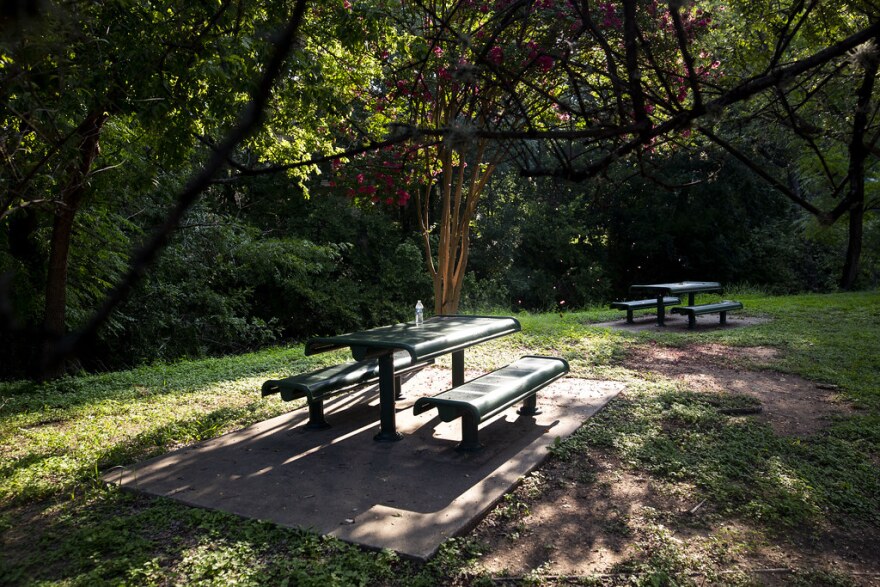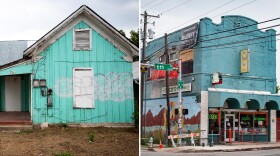In Austin, homes pay for parks. Or rather, the developers building these homes do.
Like many cities in Texas, Austin has what’s called a parkland dedication fee. Since 1985, residential developers have had to provide land or money to the city (or a mix of both) to be used for parks. In nearly all cases, builders choose to pay some fee into city coffers; this money funds the purchase and development of new parks and park amenities.
As the city grows, so should its parkland, elected officials reason. And for that, the city needs more money. On Thursday, council members are scheduled to decide two park funding issues: whether to significantly raise the park fee for residential builders, and whether to begin charging commercial developers this fee for the first time.
How many parks does Austin need?
That depends who you ask. But here’s what we know:
In 2021, nearly 70% of residents lived near a park or open space. The city defines this as within a quarter-mile (about a 5-minute walk) for people living in the city’s "urban core" and a half-mile for the rest of Austin’s residents.
According to a national scoring of city park systems, access to parks depends on the relative wealth of your neighbors. People living in low-income neighborhoods have significantly less parkland nearby than residents in wealthier parts of the city.
Austin currently has about 18 acres of parkland per 1,000 residents, a number that falls short of the city’s goal of 24 acres. The number exceeds the national average of 10 acres per 1,000 residents, however, according to the National Recreation and Park Association.
How does a parkland dedication fee work?
When builders construct a new neighborhood of single-family homes, an apartment complex or hotel, they have to provide land for parks, money to buy parks or a mix of both. In roughly 90% of cases, according to the city, developers opt to fulfill this requirement by paying some portion of a fee. (The city exempts some forms of affordable housing from this requirement.)
That fee depends on what kind of housing is being built. For a neighborhood of single-family homes, a builder is currently required to pay nearly $5,000 per home. Developers of high-rise apartment buildings have to pay nearly $3,500 per apartment.
The city can use this money, as set by state law, to buy land for parks and build park amenities, such as picnic areas and dog parks. The city cannot use the money for park upkeep.
How have these park fees changed over time?
Over the past several years, the city has significantly increased parkland dedication fees; last year it more than doubled what it charges. City staff said this increase reflects the uptick in the cost of land in Austin.
With this large influx of money, the city has been buying a lot more land to use as parks. From 2017-2019, the city bought roughly 10 acres for parks. In 2021 alone, the city bought nearly 35 acres of parkland at an average cost of roughly $544,000 per acre.
“In the last couple of years, we've been very successful in purchasing new parkland, primarily because we have had additional funds,” Thomas Rowlinson, a planner with Austin’s Parks and Recreation Department, told KUT.
What changes will elected officials vote on?
City staff have proposed nearly doubling parkland dedication fees — for the second year in a row. The change, they say, is needed to keep up with the cost of land, which has skyrocketed because of the demand for housing (and thereby land for it to be built on).
But while staff say it's needed, council members don't appear supportive of such a big increase. Mayor Pro Tem Alison Alter has proposed going as high as a 25% increase, while Council Member Natasha Harper-Madison is asking the city to keep fees flat.
Council members have also proposed for the first time requiring developers of office space and retail to provide parks or pay a fee. They are scheduled to vote on both at their meeting Thursday.
So, won't this fee increase make housing more expensive?
Austin has experienced a substantial rise in the cost of housing over the past several years. Builders say hiking the fees they pay will only make this worse.
“We're in an affordability crisis, not a parkland crisis,” said Chris Randazzo, who works for a civil engineering firm and sits on the Real Estate Council of Austin.
As the demand for housing increases, so does the price of housing (and the land it sits on). So, the city says it needs to charge developers more in order to affordable to buy land to make into parks. Yet these same developers say doing so will only make housing more expensive.
Alter has said the idea that we need to choose either lower-cost housing or parks is unfair.
“Some of this conversation involves a false choice,” she told KUT. “We need to deliver both parks and housing, and I believe that developers and developments should be called upon to pay their fair share. … Absent parks, you won't have places to go walk your dogs or take your kids to play, or get outside and get some fresh air and you will have less trees.”
Alter refutes the idea that upping the parkland dedication fee will make the eventual home sale price or rent more expensive, arguing these costs won’t get passed on.
But people who study housing say it does have an effect — albeit hard to quantify.
“The developers and builders don’t pay for it,” said Adam Perdue, an economist at the Texas A&M Real Estate Research Center. “The costs are going be split between the current landowners and the eventual house buyers. The exact proportion is unclear.”
The council will also consider at what point in the development process these fees should be paid.














